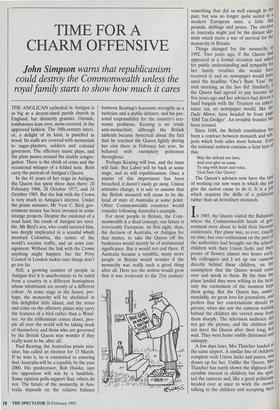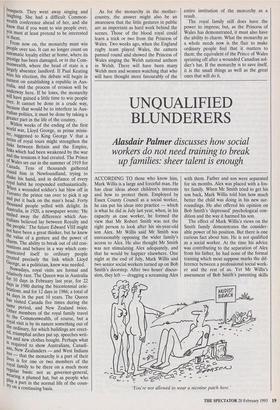TIME FOR A CHARM OFFENSIVE
John Simpson warns that republicanism
could destroy the Commonwealth unless the royal family starts to show how much it cares
THE ANGLICAN cathedral in Antigua is as big as a decent-sized parish church in England, but distinctly grander. Outside, tombstones lean over, moss-covered, in the approved fashion. The 18th-century interi- or, a delight of its kind, is panelled in wood. Its walls are covered with memorials to sugar-planters, soldiers and colonial governors. The offertory music plays, and the plate passes around the sizable congre- gation. There is the chink of coins and the occasional whisper of a folded note. Both carry the portrait of Antigua's Queen.
In the 41 years of her reign in Antigua, the Queen has spent three days there: 20 February 1966, 28 October 1977, and 24 October 1985. But the link with the Crown is very much in Antigua's interest. Under the prime minister, Mr Vere C. Bird, gov- ernment money has been invested in some strange projects. Despite the existence of a road fund, the roads of Antigua are terri- ble. Mr Bird's son, who could succeed him, was deeply implicated in a scandal which involved Colombia, the centre of the world's cocaine traffic, and an arms con- signment. Without the link with the Crown anything might happen; but the Privy Council in London makes sure things don't go too far.
Still, a growing number of people in Antigua feel it is anachronistic to be ruled from a country in a different hemisphere whose inhabitants are mostly of a different colour. At some stage in the future, per- haps, the monarchy will be abolished in this delightful little island, and the notes and coins on the offertory plates may carry the features of a bird rather than a Wind- sor. As the millennium comes closer, peo- ple all over the world will be taking stock of themselves; and those who are governed by the British Queen may wonder if they really want to be, after all.
Paul Keating, the Australian prinie min- ister, has called an election for 13 March. If he wins it, he is committed to ensuring that Australia will be a republic by the year 2000. His predecessor, Bob Hawke, says the opposition will win by a landslide. Some opinion polls support that; others do not. The future of the monarchy in Aus- tralia depends on the relative balance between Keating's fearsome strengths as a tactician and a public debater, and his per- sonal responsibility for the country's eco- nomic problems. Keating is no crude anti-monarchist; although the British tabloids became hysterical about the fact that he touched the Queen lightly during her visit there in February last year, he behaved with exemplary politeness throughout.
Perhaps Keating will lose, and the issue will fade. But Labor will be back at some stage, and so will republicanism. Once a matter of this importance has been broached, it doesn't easily go away. Unless attitudes change, it is safe to assume that the British monarch will cease to be the head of state of Australia at some point. Other Commonwealth countries would consider following Australia's example.
For most people in Britain, the Com- monwealth is a dead concept; our future is irrevocably European. At first sight, then, the decision of Australia, or Antigua for that matter, to take the Queen off the banknotes would merely be of sentimental significance. But it would not end there. If Australia became a republic, many more people in Britain would wonder if the monarchy was really such a good thing after all. Here too the notion would grow that it was irrelevant to the 21st century: something that did us well enough in the past, but was no longer quite suited to a modern European state, a little like pounds, shillings and pence. The election in Australia might just be the distant skir- mish which starts a war of survival for the monarchy in Britain. Things changed for the monarchy in 1992. Two years ago, if the Queen had appeared at a formal occasion and asked for public understanding and sympathy for her family troubles she would have received it; and no newspaper would have used the headline 'One's Bum Year' the next morning, as the Sun did. Similarly, If the Queen had agreed to pay income tax five years ago and her advisers had driven a hard bargain with the Treasury on inheri- tance tax, no newspaper would, like the Daily Mirror, have headed its front page 'HM Tax-Dodger'. An invisible frontier has been crossed.
Since 1688, the British constitution has been a contract between monarch and sub- jects which both sides must honour. Even the national anthem contains a faint hint of this: May she defend our laws,
And ever give us cause To sing with heart and voice,
'God Save Our Queen'.
The Queen's advisers now have the task of working out new ways in which she can give the nation cause to do it. It is a job which requires the skills of a politician rather than an hereditary monarch.
In 1985, the Queen visited the Bahamas' where the Commonwealth heads of gov- ernment were about to hold their biennial conferenCe. Her plane was, as ever, exactlY on time, but over-enthusiasm on the part of the authorities had brought out the school- children with their Union Jacks and their posies of flowers almost two hours eartY. My colleagues and I set up our cameras directly behind these children, on the assumption that the Queen would come over and speak to them. By the time the plane landed they were wilting in the heat; only the excitement of the moment kept them going. But the Queen has, under- standably, no great love for journalists, and prefers that her conversations should be private; when she saw the cameras waiting behind the children she veered away from them sharply. The television audience did not get the picture, and the children did not meet the Queen after their long, bot, wait. They went home visibly distressed and unhappy. A few days later, Mrs Thatcher landed at the same airport. A similar line of children, complete with Union Jacks and posies, was drawn up for her. Unlike the Queen, Mrs Thatcher has rarely shown the slightest dis- cernible interest in children; but she spot- ted the cameras and, like a good politician, headed over at once to work the crowd, talking to the children and accepting the
bouquets. They went away singing and laughing. She had a difficult Common- wealth conference ahead of her, and she knew that if you want to win people over, you must at least pretend to be interested in them.
From now on, the monarchy must win People over too. It can no longer count on automatic loyalty either at home, where its prestige has been damaged, or in the Com- monwealth, where the head of state is a largely absentee landlord. If Paul Keating wins his election, the debate will begin in earnest on establishing a republic in Aus- tralia, and the process of erosion will be underway here. If he loses, the monarchy will have gained a little time to win people over. It cannot be done in a crude way, because that would be to interfere in Aus- tralian politics, it must be done by taking a greater part in the life of the country. Within weeks of the ending of the first world war, Lloyd George, as prime minis- ter, suggested to King George V that a series of royal tours might strengthen the links between Britain and the Empire, links which had been weakened by the war and the tensions it had created. The Prince Canada. Wales set out in the summer of 1919 for Lanada. Tens of thousands gathered round him in Newfoundland, trying to shake his hand, and in defiance of every royal habit he responded enthusiastically. When a wounded soldier's hat blew off in Toronto the prince ran over to pick it up and put it back on the man's head. Forty thousand people yelled with delight. In Australia, in 1920, a newspaper wrote: 'He smiled away the difference which Aus- tralians believed lay between Royalty and the people.' The future Edward VIII might not have been a great thinker, but he knew the value of a gesture and the power of charm. The ability to break out of old con- ventions and behave in a way which com- municated itself to ordinary people created precisely the link which Lloyd George, as a politician, knew was needed. Nowadays, royal visits are formal and felatively rare. The Queen was in Australia days 10 days in February last year, for 22 uaYs in 1980 during the bicentennial cele- brations, and for 12 days in 1986; a total of '',t4 days in the past 10 years. The Queen has visited Canada five times during the same period, and New Zealand twice. Other members of the royal family travel to the Commonwealth, of course, but a royal visit is by its nature something out of the ordinary, for which buildings are erect- ed, triumphal arches put up, speeches writ- ten and new clothes bought. Perhaps what is required to show Australians, Canadi- ris, New
Zealanders — and West Indians
,F113 — that the monarchy is a part of their 'Ives is for one or two members of the royal family to be there on a much more regular basis: not as governor-general, Wearing a plumed hat, but as people who play a part in the normal life of the coun- t' on a continuing basis.
As for the monarchy in the mother- country, the answer might also be an awareness that the little gestures in public are as important as hard work behind the scenes. Those of the blood royal could learn a trick or two from the Princess of Wales. Two weeks ago, when the England rugby team played Wales, the camera panned round and showed the Princess of Wales singing the Welsh national anthem in Welsh. There will have been many Welsh men and women watching that who will have thought more favourably of the entire institution of the monarchy as a result.
The royal family still does have the power to impress; but, as the Princess of Wales has demonstrated, it must also have the ability to charm. What the monarchy as a whole needs now is the flair to make ordinary people feel that it matters to them: the equivalent of the Prince of Wales sprinting off after a wounded Canadian sol- dier's hat. if the monarchy is to save itself, it is the small things as well as the great ones that will do it.



























































 Previous page
Previous page